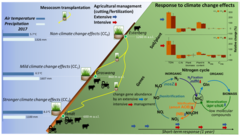News
New publication about the soil translocation experiment at the Esterbergalm
Soil microbiome response to climate change effects and land management indicate significant interactions between these two factors that caused shifts in microbial N turnover in pre-alpine grasslands. We found that at the short-term the microbial biomass was significantly reduced, which was further accompanied by lower abundances of N2-fixing and ammonia oxidizing bacteria under intensive management. Surprisingly, the abundances of denitrifying bacteria as well as N2O emissions were not significantly affected by the treatments although soil and plant properties were already influenced after a short simulation period of one year. Our data are an important contribution as baseline to analyze functional groups response at the long-term exposure to climate change and agricultural management. The results of this study have now been published in "Science of the Total Environment" (https://doi.org/10.1016/j.scitotenv.2021.146672).

